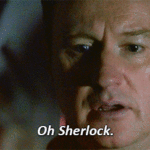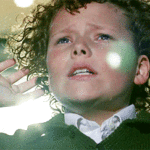(Note: Trigger warning: Suicide/ Suicidal intention. This is the second part of this post. I edited the original post slightly and moved the conclusion over to this one and expanded it. I’m borrowing some of my own thoughts from here.)
John: Look, Sherlock, this is the biggest and most important day of my life.
Sherlock: Well …
John: No, it is! It is, and I want to be up there with the two people that I love and care about most in the world.
Sherlock: Yes.
John: Mary Morstan …
Sherlock: Yes.
John: … and … you.
…
Sherlock: So, in fact …you-you mean …
John: Yes.
Sherlock: I’m your …best …
John: … man.
Sherlock: … friend?
John: Yeah, ’course you are. ’Course you’re my best friend.Saying that Sherlock is stunned by this information would be an understatement, but as hilarious as the delivery is, it drives home a very important point.
Sherlock has never understood how John feels about him. Sherlock has always believed that John values him because he is clever and brilliant, and because it meant that John gets the danger and adventures that he so clearly needs.
Reconsider the Reichenbach phone call again. If Sherlock believes that all John cares about his cleverness, he has to believethat if John stops valuing that, that he will simply walk away, that he will no longer care about Sherlock. “I’m a fake.” Sherlock tells him. He isn’t just saying goodbye or trying to protect John-he’s trying to convince John that everything that he has ever believed mattered about Sherlock is a lie. Sherlock is trying to break John’s faith in him, hoping that it will lessen the loss. “Nobody could be that clever.” Sherlock tells him. John doesn’t see the truth of what Sherlock is really saying, what it really means, and he simply tells Sherlock “You could”. They’re not having the same conversation, and so Sherlock goes to his ‘death’, believing that John still values him for his cleverness, but nothing more. He spends the next two years, on his own and lonely, believing that he does not matter to anyone beyond that. He comes back to find John furious and can’t make sense of his anger, because he doesn’t understand the source of it. He doesn’t understand how much of a loss his ‘death’ was. He doesn’t realize that John might forgive him, because he doesn’t realize what is there underneath the anger.
It’s not until John finally spells it out for him that Sherlock finally sees the truth of it. He matters to John. John loves him.
And so, when Sherlock is confronted by Major Sholto, it gets to him. All along, Sherlock has been taking in the similarities and he, while occasionally jealous of Major Sholto’s connection with John, sees himself. He sees a man needlessly dying, a man who is willfully letting his life be taken. He sees someone that John loves about to take his own life in front of him. Again. “There’s a proper time to die, isn’t there?” Major Sholto says. “And one should embrace it when it comes.” But Sherlock understands the cost of that; the cost of embracing a death that could be avoided, of accepting the story that someone else has written for you. More than that, he knows the cost of doing that to someone who loves you. He understands all too well the grief and pain that it causes. He knows just what to say. “We wouldn’t do that, would we – you and me? We would never do that to John Watson.”
And Sherlock wouldn’t. At least, not anymore.
He steps back, knowing that he has seen the truth of it, knowing that it will work, even as John threatens to break down the door.
Major Sholto emerges and says to John what Sherlock now realizes he should have said before, on the day he faked his death. “I believe I am in need of medical attention.”
“I believe I am your doctor.” John says. And he is, to both of them.
A Study In Chairs – the symbolism of John and Sherlock
We all know the chairs. The two chairs: one black, other red.
They’re John’s and Sherlock’s chairs, which they sit in when they listen to their clients and talk to each other.
But the chairs are – and have always been – quiet symbols of the progress and state of John’s and Sherlock’s friendship.
Every step of the way.
The fastidious ick of Charles Augustus Magnussen
Well now aren’t these two are a pair. No, really, I’ve been thinking a lot about identification and desire in this third series, and Magnussen’s like a slightly grotesque reflection of Sherlock. He’s in a strange opposition to Moriarty, almost like superego and id. (I’m not fond of Freud’s id/ego/superego theory, too schematic for me, but it does interesting work here. To review: id is base animal instinct, driven by the pleasure principle without restraint; ego is primary self, operating through the reality principle to make sense of the self-in-the-world; superego is civilization, the strictures of morals and manners.) In appearance Magnussen could hardly be farther from Moriarty:
In psychological function, too, they’re starkly differentiated: Moriarty raving in that padded oubliette is pure id, real bloody bottom-of-the-brain stuff, unfiltered by reason. (“Padded oubliette” is sublim8’s term, and it’s perfect for this grimy cell of the unconscious.) He’s fixed on the primal forces—fear, pain, death; mother, father, sex (the Woman)…and John. Love. The force that opposes Moriarty at the core of Sherlock’s being. When Jim tells him that heartbreak, loss, and death are “all good,” John in reality touches his face and calls to him. Reaching in through the purest animal need to live, John will always call Sherlock back to his life and his best self.
Random theory about Mummy and Sherlock Holmes:
So mum was a brilliant mathematician who gave it up to raise children, as was expected at the time.
What if she planned on going back to her career when Mycroft was in school, only to suddenly find herself pregnant with Sherlock.
…
Better explanation then me











